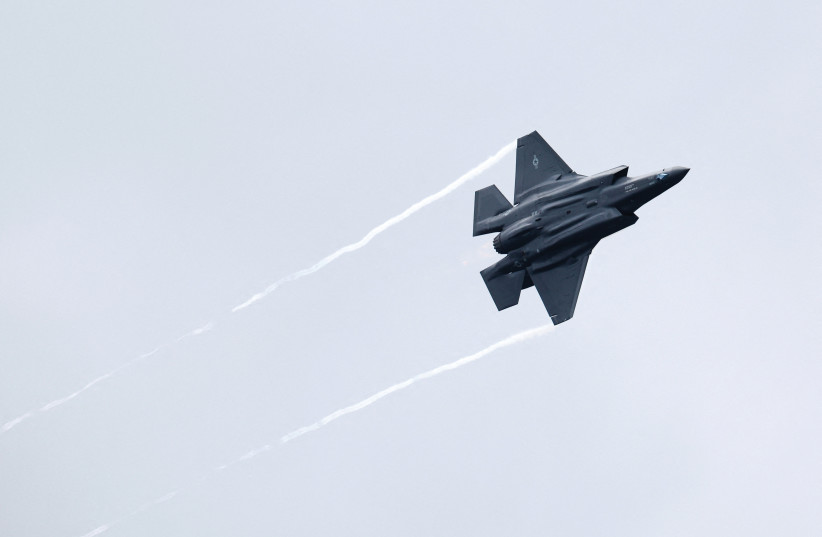Defense Minister Yoav Gallant on Sunday approved the purchase of a third squadron of 25 F-35 aircraft from Lockheed Martin, which will eventually bring Israel’s total complement to 75 aircraft.
A statement from the ministry did not give a timeline, but sources have previously indicated to the Jerusalem Post that even if Israel would formally order this third round next 25 aircraft sometime in 2023, it may take until 2026-2027 for the deliveries to come through.
The F-35 is considered crucial in the MABAM “war between wars” against Iranian proxies in Syria as well as in the event that the IDf would need to eventually strike Iran’s nuclear program.
What you need to know about the Israeli Air Force’s F-35 stealth fighter
It has stealth technology which makes it more able to strike targets throughout the Middle East with impunity and its surveillance and intelligence capabilities far exceed Israel’s older F-16 and F-15 aircraft.
For example, it is said to be easily capable of outwitting Iran’s S-300 anti-aircraft missile defense system, and possibly even the S-400 system, whereas other Israeli aircraft would have more trouble.
Gallant said he approved the purchase upon the recommendation of IDF Chief of Staff Lt.-Gen. Herzi Halevi, Defense Ministry Director-General Eyal Zamir, and Israeli Air Force head Maj.-Gen. Tomer Bar.
 A LOCKHEED MARTIN F-35 stealth jet performs a flying display at the 54th International Paris Airshow at Le Bourget Airport this week. (credit: BENOIT TESSIER/REUTERS)
A LOCKHEED MARTIN F-35 stealth jet performs a flying display at the 54th International Paris Airshow at Le Bourget Airport this week. (credit: BENOIT TESSIER/REUTERS)The purchase was held up by political instability in Israel
Sources have indicated that this purchase could have happened years ago but was held up by political instability due to the many rounds of elections which negatively impacted Israel’s ability to put together longer-term budget plans, even for some defense issues.
Following the defense ministers’ approval, the ministry’s Mission to the US will issue an official letter of request to the F-35 Lightning II Joint Program Office (JPO). This step will facilitate the approval and signing of the transaction in the coming months, the ministry said.
The value of the deal is approximately $3 billion, financed by US aid funds. As part of the original agreement between the governments, Lockheed Martin, and the engine manufacturer, Pratt & Whitney, have committed to involving Israel’s defense industries in the production of aircraft components that are being bought.
“This new agreement will ensure the continuation of cooperation between American companies and Israeli defense industries in the production of aircraft parts,” said a ministry statement.
Joshua (Shiki) Shani, CEO of Lockheed Martin Israel, responded, “We are proud to support the Israeli Defense Forces in providing the F-35, and honored that the Israeli government has announced its intent to purchase additional F-35s.”
“The Israeli Air Force has proven its capabilities in critical operations with the 116 and 140 Squadrons, and we are looking forward to building on this strong performance. With a combination of stealth, sensor fusion and electronic warfare, the 5th Generation F-35 will ensure the Israeli Air Force stays ahead of current and evolving threats,” he said.
Recent Israeli investments in Air Force reinforcement
At the same time, over the last year, Israel has moved forward on some parallel advancements and investments in the air force’s future.
After years of delay, the Defense Ministry in January officially requested 25 F-15 EX Boeing fighters from the US to help replace its aging F-15 aircraft.
In November 2022, Israel finalized an agreement to purchase four Boeing KC-46A midair refueling aircraft.
Each of those new aircraft elements are also some years from being delivered to Israel, but would also eventually boost Jerusalem’s capability for attacking Tehran’s nuclear program, if needed.
The F-35’s record has not been perfect.
In mid-December 2022, an F-35 aircraft crashed in the US, leading both America and Israel to ground a significant portion of their F-35 fleets.
For an extended period, there have been issues with the F-35’s cockpit software technology.
Still, as of March, a technical fix was approved for the defect which caused the 2022 crash and deliveries were resumed.